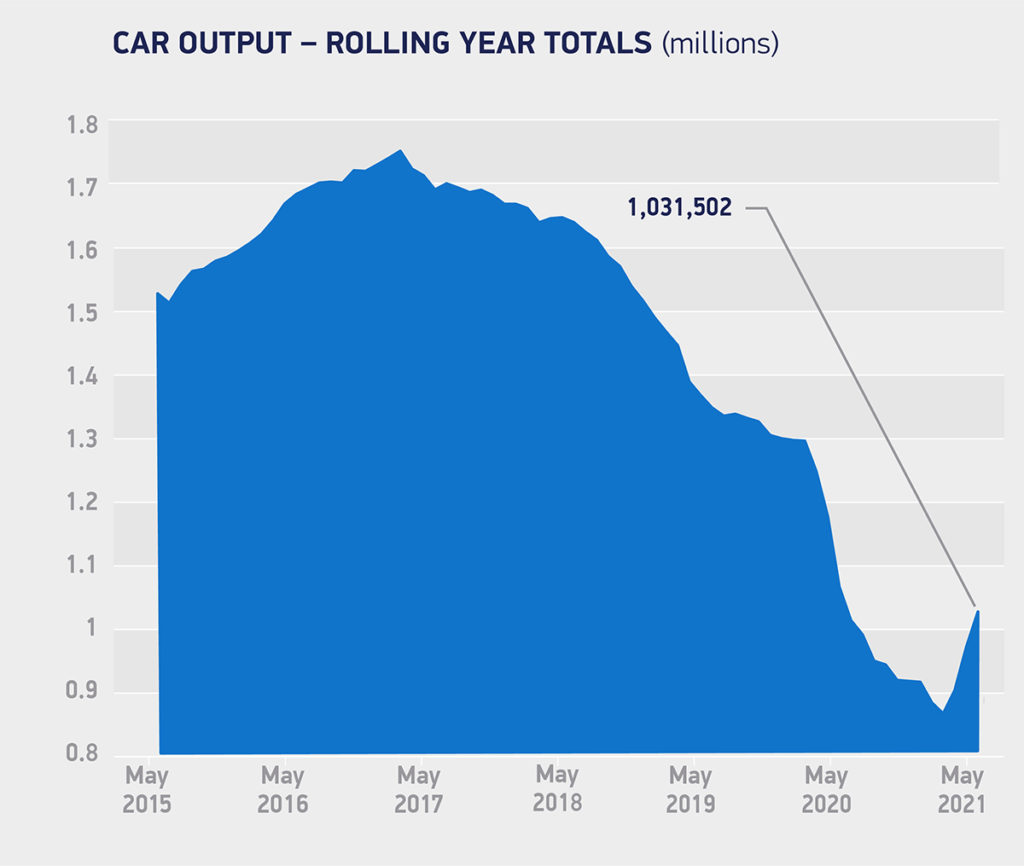Car production in slow recovery
Latest figures show rise in production but still far below pre-covid figures
There was a tenfold increase in UK car production in May compared to the same month last year.
The new data from by the Society of Motor Manufacturers and Traders (SMMT) shows it is still well below pre-pandemic levels. In truth, it remains 52.6% down on the same month in 2019.
However, 54,962 cars rolled off production lines in May compared to just 5,314 a year ago, when coronavirus halted manufacturing.
Improving picture

This year, UK factories turned out 429,826 cars. This is up 105,063 units on last year, with 95% built for export. Despite this, overall output remains 23% down on the same five-month period in 2019.
The SMMT says that this reflects the scale of the challenge facing the industry. It is seeking to recover from the pandemic, grapple with global supply shortages, deal with Brexit uncertainties, while the public deliberate on investing in EVs.
In the short-term, every car producer is being impacted by the computer chip crisis. Delivery times are lengthening from three to six months, and could extend further.
Lagging behind
The new data from the SMMT shows that, when compared with a five-year average, production was down by more than half (58%) for the May.
Mike Hawes, chief executive of the SMMT, says “the recovery of car production is still massively challenged here and abroad by global supply shortages, particularly semiconductors”. He warns that “if the UK is to remain competitive, therefore, it must ensure it has a globally attractive policy framework”.
Whether car production or parts supply, remaining at the cutting edge is essential in a highly competitive market. “We need to drive investment in R&D, charging infrastructure and the market to ensure we can deliver the net zero future society demands.”
In May, 19% of all UK car output was battery electric and hybrid cars. In the year-to-date, one in five vehicles manufactured in the UK were alternative fuel models. However, this share drops to one in 16 for pure battery electric vehicles and one in six for hybrid cars.
Looking ahead
UK car production continues to be export-led – 84% of all cars built so far in 2021 have been shipped overseas. The European Union remains by far the most important destination for British cars, taking 56% of all exports, followed by the US (18%) and China (7%).
“Global inflationary pressures affecting materials like copper, steel and oil are adding to the well reported issues surrounding semiconductor supply,” he adds. “While the Covid-19 picture is improving, new outbreaks have forced some port shutdowns in China, creating new blockages in the global supply chain.
He describes car manufacturers concentrating on higher margin models. This generally means “developing and rolling out electric vehicles”. The idea is to “safeguard market share and competitive positioning in this fast-growing part of the market”.
Multiple manufacturers are in talks with the UK Government over the construction of gigafactories, which he describes as “encouraging”. While this won’t impact production in the near term, “their development will be crucial for the future of the UK automotive sector”. Shipping heavy batteries overseas, as well as the competition for batteries, makes this an important area of development.
Volkswagen chief executive, Herbert Diess, said last month that it was in “crisis mode” over the shortage. He believes the impact will only intensify.






